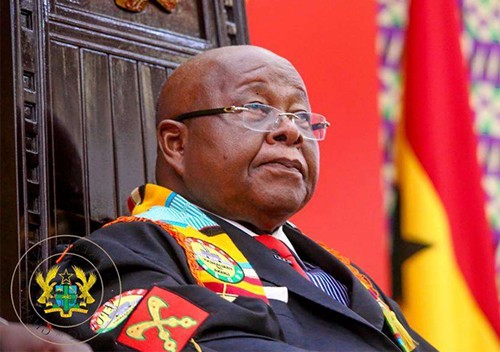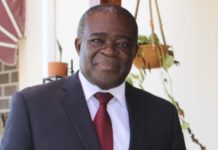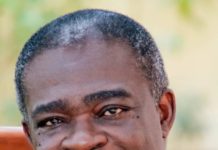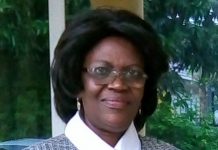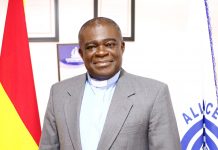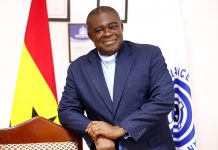|
Getting your Trinity Audio player ready...
|
The Speaker of Parliament, Professor Aaron Mike Oquaye, has called for an end to monetisation which is rearing its ugly head in the country’s democratic practice, especially in the run-up to general elections.
He said allowing the practice to be a feature of the competitive democratic process only compromised good governance in a fledgeling democracy.
Ceiling election expenses
Addressing the end of the Second Meeting of the Fourth Session of Parliament last Friday, Prof. Oquaye said: “Monetisation of our democracy compromises the democratic process of good governance. As a country, we have not really captured the political will to arrest the situation.”
“We do not want funding to become the yardstick for the proliferation of political parties. We need a new law on political party income and expenditure generally, particularly with regard to putting a ceiling on election expenses,” he stated.
Prof. Oquaye said: “As we prepare for Election 2020, I am aware that members are concerned about election expenses. It is about time we critically examined issues of ‘monecracy’.”
Political Parties Support Fund
The Speaker said many democratic nations across the world had enacted laws on political party income and expenditure and established support funds for parties to curb expenses during elections.
He, therefore, urged Members of Parliament (MPs) and Ghanaians in general to consider the setting up of a Political Parties Support Fund (PPSF), which would be managed by a special committee of the Electoral Commission (EC).
“It is, therefore, important that we remove every element of mistrust in the EC, while we hold it accountable for its responsibilities. I have no shadow of doubt that the enactment of the Private Members’ Bill will significantly help us tighten gaps in our existing laws,” he said.
Avoid hate speech
Prof. Oquaye also urged MPs, as custodians of democracy, to be mindful of any hate speeches and political engagements which would “mar the beauty of our democracy”.
“It is important that, as legislators, we uphold the laws that we have passed. I am confident you will also educate your constituents on the Public Order Act, 1994 (Act 491), the Public Elections Regulations, 2016 (31.94) and other laws which are geared towards the preservation of our democracy.
“The peace of this country is essential for creating a congenial atmosphere for good governance. We need to appreciate the ingredients that make for democracy and good governance. Half democracy is no democracy,” he said.
History
The Speaker expressed happiness that for the first time in the country’s parliamentary history, the House adopted a motion for the enactment of a Private Members’ Bill on July 16, this year.
He expressed appreciation to the leadership of the House and all members, the STAR-Ghana Foundation, staff of the Legislative Drafting and Legal Services Department, experts from civil society organisations, the Deputy Attorney-General, Mr Godfred Dame, and legal luminaries, including Nana Dr S.K.B. Asante, for their support.
Crime against aged women
Recalling the recent lynching of a 90-year-old woman in public after she had been declared a witch by a spiritualist, Prof. Oquaye outlined measures to stop such heinous crimes against women.
He informed the House that he had received a petition from a research institute in Ghana for a law to be passed in Ghana on the declaration of some aged women as witches.
“I charged the consultant on the Private Members’ Bill, Mrs Ofori-Boateng, and Lawyer Sena to undertake a research. The proposed bill is being referred to our Constitutional and Legal Committee for further action.
“Highlights include the prohibition of professional witchcraft or wizardry, prohibition against the accusation of witchcraft, participation in the declaration of a person as a witch or wizard and penalty against a chief or headman encouraging witchcraft,” he said.
Sittings
The House held 52 plenary sittings in 13 weeks that saw 424 papers, including bills, constitutional/Legislative and Executive instruments, committee reports, conventions, loan agreements, motions, waivers, annual reports and resolutions presented to the House.
Bills passed
The bills that were passed into law were the Chartered Institute of Human Resource Management, Ghana Bill, 2019; the Chartered Institute of Marketing, Ghana Bill, 2019; the Land Bill, 2019, and the Education Regulatory Bodies Bill, 2019.
The rest were the Ghana Communication Technology University Bill 2020; the Revenue Administration (Amendment) Bill, 2020; the Aircraft Accident and Incident Investigation and Prevention Bureau Bill, 2020; the Minerals Income Investment Fund (Amendment) Bill, 2020; the Akenten Appiah-Menka University of Skills and Training and Entrepreneurial Development Bill, 2020; the Registration of Births and Deaths Bill, 2020; the Security and Intelligence Agencies Bill, 2020; the Development Financial Institutions Bill, 2020, and the Communication Services Tax (Amendment) Bill, 2020.
Instruments passed
Also, the following constitutional/legislative and Executive instruments were passed during the meeting.
They included the Ghana AIDS Commission Regulations, 2020; the Minerals and Mining (Mineral Operations Tracking of Earth Moving and Mining Equipment) Regulations, 2020; the Meat Inspection Regulations, 2020; the Local Government (Consultations) Regulations, 2020; the Chieftaincy (Membership of Regional Houses of Chiefs) Instrument, 2020, and the Public Elections Regulations, 2020.
The others are the Representation of the People (Parliamentary Constituencies) Instrument, 2020; the Engineering Council Regulations, 2020; the Public Financial Management (Public Investment Management) Regulations, 2020; the Transfer Pricing Regulations, 2020, and the Public Utilities Regulatory Commission (Consumer Service) Regulations, 2020.



